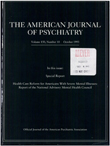The nature and course of olfactory deficits in Alzheimer's disease
Abstract
OBJECTIVE: The aim of this study was to determine the specific nature and course of olfactory deficits in Alzheimer's disease. Previous studies had noted impaired odor identification, but there was no unanimity about the presence of odor detection deficits. METHOD: Odor identification was tested in 55 patients with Alzheimer's disease and 57 elderly control subjects by using the University of Pennsylvania Smell Identification Test. Odor detection was assessed in 46 subjects with Alzheimer's disease and 40 control subjects by using a forced- choice threshold test with geraniol as the odorant. RESULTS: Significant deficits in olfactory identification were present in subjects who were in the earliest stages of cognitive impairment, and these deficits increased as Alzheimer's disease progressed. There was some overlap in individual smell identification test scores between cognitively impaired patients and normal elderly subjects. On the other hand, odor detection deficits did not appear until Alzheimer's disease was relatively advanced. Smell identification test scores were correlated with Mini-Mental State scores, but geraniol detection was not. CONCLUSIONS: Odor identification is impaired early in Alzheimer's disease and may be more influenced by cognitive status than is acuity of odor detection, which is not altered until later in the disorder. The pattern of hyposmia in Alzheimer's disease suggests that the disorder may not "begin in the nose," as has been theorized previously. Further refinement of olfactory testing may be useful in the diagnostic evaluation of early dementia.
Access content
To read the fulltext, please use one of the options below to sign in or purchase access.- Personal login
- Institutional Login
- Sign in via OpenAthens
- Register for access
-
Please login/register if you wish to pair your device and check access availability.
Not a subscriber?
PsychiatryOnline subscription options offer access to the DSM-5 library, books, journals, CME, and patient resources. This all-in-one virtual library provides psychiatrists and mental health professionals with key resources for diagnosis, treatment, research, and professional development.
Need more help? PsychiatryOnline Customer Service may be reached by emailing [email protected] or by calling 800-368-5777 (in the U.S.) or 703-907-7322 (outside the U.S.).



